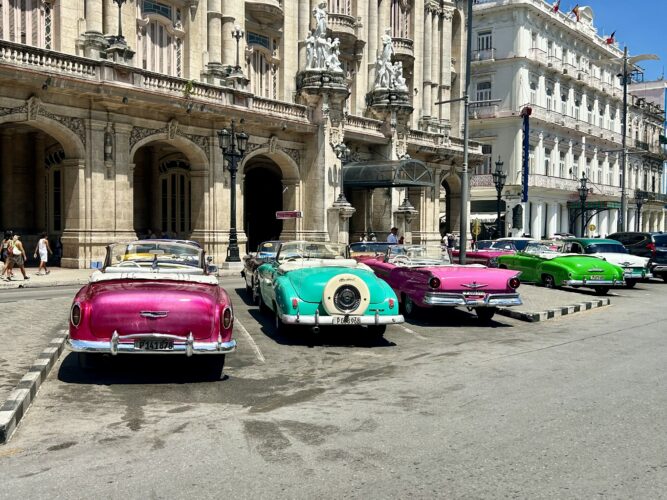I’ve been back from my latest holiday for some weeks now, and the memories are still keeping me warm in this cold weather we’re having in Melbourne.
As I reflect on the organising (and other) lessons learned, as I always do, I realise we packed a lot in to our five and a half weeks away. The numbers are impressive. We visited ten countries. We took twelve flights and one week-long cruise. We named it our 3Cs holiday – Cricket in Barbados, a Caribbean cruise and a tour of Cuba.
All of it was lovely, including our London and Paris stopovers on the way to and from the Caribbean. But as far as lessons go, I learned the most in Cuba.
You may have heard about the music. That’s where the Buena Vista Social Club is found, and it was a fun night there. You may have heard about the revolutionaries of the past. We learned lots more about Fidel Castro and Che Guevara during our time there. You may have heard of the cool vintage cars in the streets of Havana. Yes, there are lots of them, smartly dressed up and preserved. But there are many more old cars limping along the Cuban roads, and very few shiny new cars. That’s because of the scarcity of parts and lack of access to imports, and the low spending power of the average Cuban citizen.
Times are tough for Cubans and getting tougher. Our guides did their best to explain the complexities of the politics, commerce, historical context of their country. The United States embargo against Cuba, in place since 1960, has recently been tightened, putting even more pressure on a country and its people doing their best to survive.
What it looks like on the ground is round the clock blackouts. Twenty hours per day without electricity is normal in some parts of the country. The longest blackout we experienced, while staying in a family run guesthouse, was thirty-two hours. Can you imagine?
Then there’s a lack of reliable access to necessary goods. At any given time, there may be restricted access to fuel, soap, salt, flour, sugar and medication, to name just a few. When people begging approached us, they didn’t ask for money. They asked for soap and paracetamol. When our tour bus needed to refuel, we were taken to a golf club to relax and wait. There was no telling how long the refuelling process would take, dependent on queues and availability. By the way, it took over an hour. Even if people have the money to buy those necessities, they can’t get access to them. Can you imagine?
Imagine trying to run a guesthouse or a restaurant. Imagine trying to feed your family. Imagine doing that without reliable electricity and without the basics. But somehow, they do. Through necessity, Cubans are very resourceful people. No electricity? Fire up the generator. No fuel to boil the kettle? A campfire will do. No fresh pork this week? There will be something else instead. It was typical for a restaurant to have a long menu, but when ordering our meal, it was also typical to be told, “not today” with an explanation of what they do actually have available.
Another sign of resourcefulness is how they make the most of the local produce. Chickens roam freely, and there are always eggs at breakfast. Fruit is abundant, and freshly squeezed mango juice is also a breakfast staple. The options may be few, but the quality is excellent.
Apart from managing these tricky logistics, how do Cubans cope with the stress? Iván, our guide, assured us, and we saw for ourselves, that Cubans laugh a lot. He says they also dance a lot. In the evening, when they turn on the television to watch the news, followed by the “soaps”, they often get just the news before the power goes out. Iván’s wife hates to miss her favourite shows, but it gives them the opportunity to sit on their front steps and talk to their neighbours who are also experiencing the blackout. Children play in the street while the adults chat.
Our tour of Cuba was interesting and fun and hot. If you’re considering a trip, don’t go in July, when the temperatures are hottest. Our trip timing was dictated by the Cricket in Barbados. Air conditioning only works when the power works. Generators can run fans and lights. But generators are turned off overnight to conserve fuel. My favourite days were when we went swimming in the sea.
I hope Cubans can find a way to rebuild, survive and keep laughing. We can learn a lot from their resourcefulness and resilience.
You can read more of my organised travel posts here.

Lined up and ready to take tourists on a ride through Havana.



